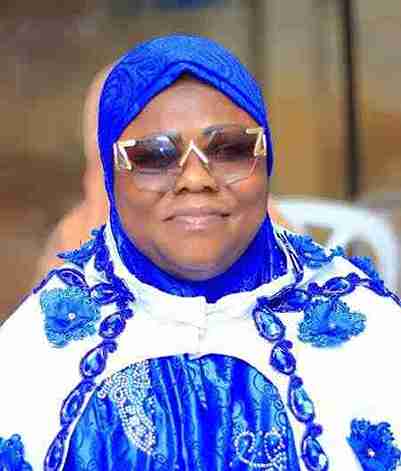Tensions Deepen as Kwara Court Remands Alhaja Kafilat Kaola Over Defamation Allegations Against Sheikh Akewugbagold
A Magistrate Court sitting in Ganmo, Kwara State, has ordered the remand of Alhaja Kafilat Kaola, a well-known Islamic personality and Ibadan-based radio broadcaster, at the Oke Kura Correctional Centre, pending further hearing in a case of alleged defamation.
Alhaja Kaola, recognized by many for her influence in Islamic media circles, is facing accusations of making statements purportedly harmful to the reputation of Alhaji Taofeek Akewugbagold, a prominent Islamic scholar and the Wazeer Muslimeen of Oyo State. Though the court has yet to reveal the precise content of the alleged defamatory remarks, the case has reignited public interest, given the public stature of both individuals involved.
A Complex Relationship Turned Sour
The relationship between Kaola and Akewugbagold was not always hostile. Records indicate that in 2021, during Akewugbagold’s conferment as the Wazeer Muslimeen of Oyo State, Kaola was among those who publicly lauded his leadership and generosity towards the Muslim community.
However, circumstances appear to have shifted dramatically, culminating in the current legal battle. Observers note that personal disagreements, possibly fueled by public statements or social media engagements, may have escalated tensions between the two figures.
Who is Alhaja Kafilat Kaola?
Alhaja Kafilat Kaola is an influential Islamic figure, widely known for hosting religious programs on radio in Ibadan and across southwestern Nigeria. Her popularity stems from her articulate delivery of Islamic teachings and social commentary, earning her both admiration and criticism.
Her remand has generated significant conversations online, with some supporters questioning whether the defamation charge might be connected to wider disputes within Islamic circles. Others argue that the judiciary must remain firm in curbing statements capable of damaging reputations, regardless of the speaker’s social standing.
The Figure at the Centre: Sheikh Akewugbagold
Alhaji Taofeek Akewugbagold commands significant respect within Nigeria’s Islamic community. He previously served as Chairman of the Oyo State Muslim Pilgrims Welfare Board, overseeing numerous religious pilgrimages and community development projects.
His conferment as Wazeer Muslimeen of Oyo State in 2021 marked a high point in his religious career, with the title often likened to a prime ministerial role within Islamic leadership structures.
Yet, Akewugbagold has not been free of personal trials. In 2020, his family faced a traumatic ordeal when his twin children were abducted in Ibadan. The incident attracted nationwide attention and led to the arrest of multiple suspects, highlighting the vulnerabilities that public figures sometimes face.
Legal Landscape: Defamation in Focus
The current dispute underscores a broader trend in Nigeria’s legal system, where defamation cases involving high-profile individuals are gaining prominence. Legal experts point to several recent examples, including the 2023 case involving social media influencer Abdulazeez Adegbola, widely known as Tani Olohun. He faced legal action for allegedly defaming traditional rulers and Islamic clerics in Kwara State.
Analysts believe the rise in defamation lawsuits may be fueled by the proliferation of social media platforms, which have amplified public discourse but also made reputations more vulnerable to swift damage.
Implications for Religious and Social Communities
While the court proceedings against Kaola continue, many in the Muslim community are watching closely to see how the situation unfolds. Religious leaders, scholars, and community members have called for restraint and urged both parties to seek amicable resolution if possible.
However, others stress that defamation, if proven, must be addressed through legal channels to preserve the integrity of public discourse and protect individuals from character assassination.
What Lies Ahead
As the Magistrate Court continues to deliberate on the matter, further hearings are anticipated in the coming weeks. The outcome could significantly impact both Kaola’s career as an Islamic broadcaster and the public perception of Akewugbagold.
For now, many Nigerians await clarity on the specific allegations that led to Kaola’s remand and whether reconciliation or further legal battles will define the next chapter in this high-profile conflict.
Public Reactions and Social Media Buzz
Social media platforms have been flooded with mixed reactions. While some users express sympathy for Kaola, believing she might be a victim of internal rivalries, others side firmly with Akewugbagold, calling for accountability and respect for religious leaders.
Several prominent figures in Islamic circles have urged the public to avoid hasty judgments until the court reveals concrete evidence regarding the alleged defamatory statements.
Conclusion
The defamation case involving Alhaja Kafilat Kaola and Sheikh Akewugbagold reflects the increasingly delicate balance between freedom of expression and the protection of personal reputation in Nigeria. As legal proceedings unfold, the public remains eager for transparency and justice, hoping the case will set a clear precedent for similar disputes in the future.
For readers interested in related topics, check out our latest news updates, explore insightful stories, or discover opportunities through our admission and education guides.

